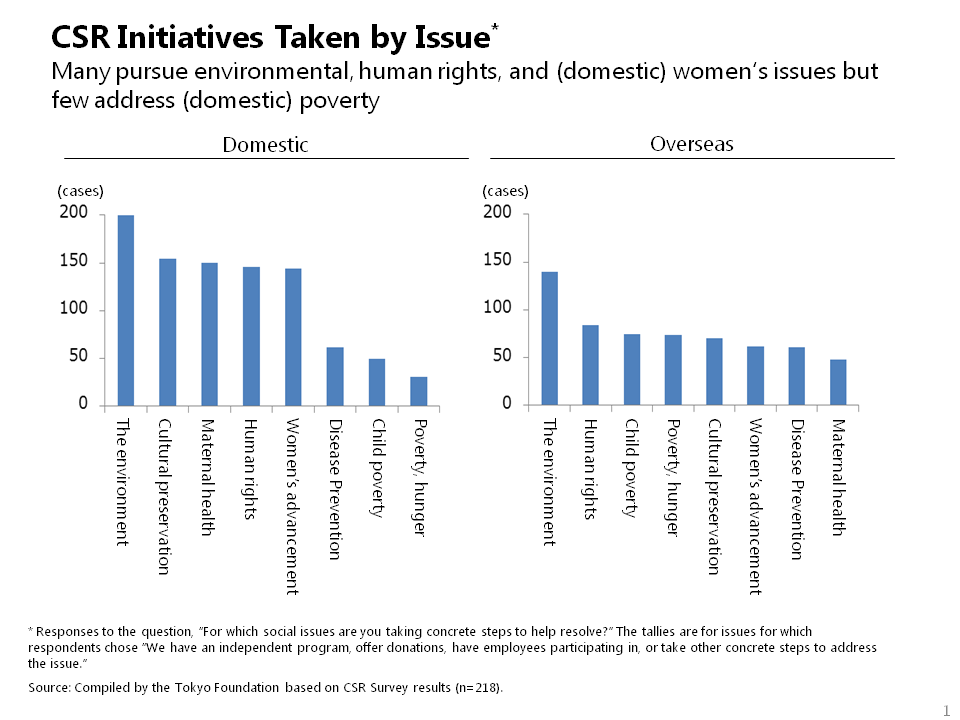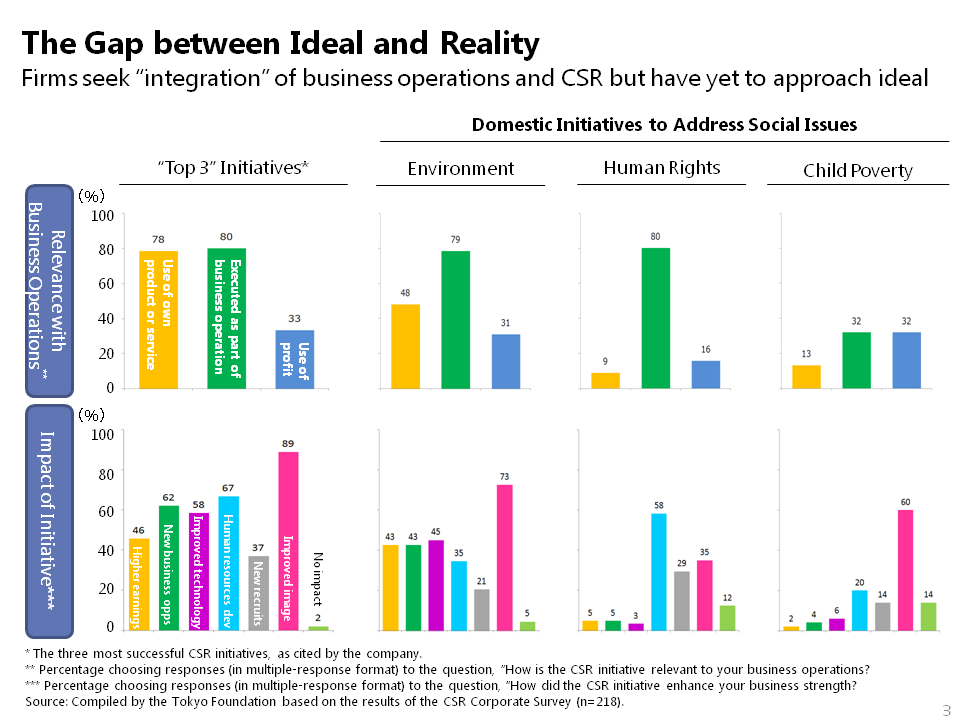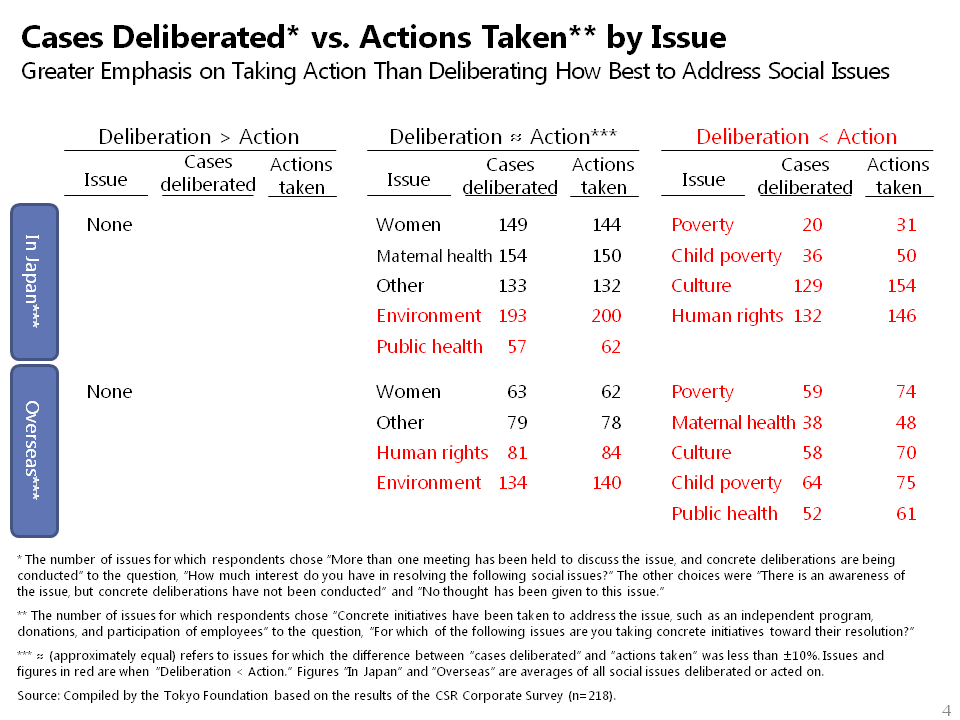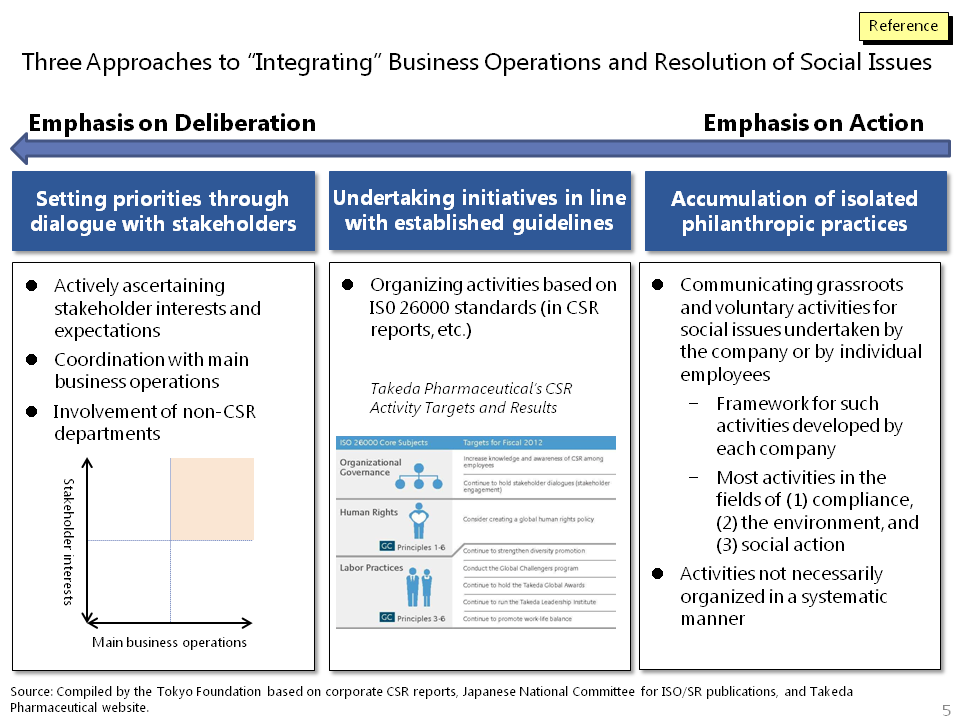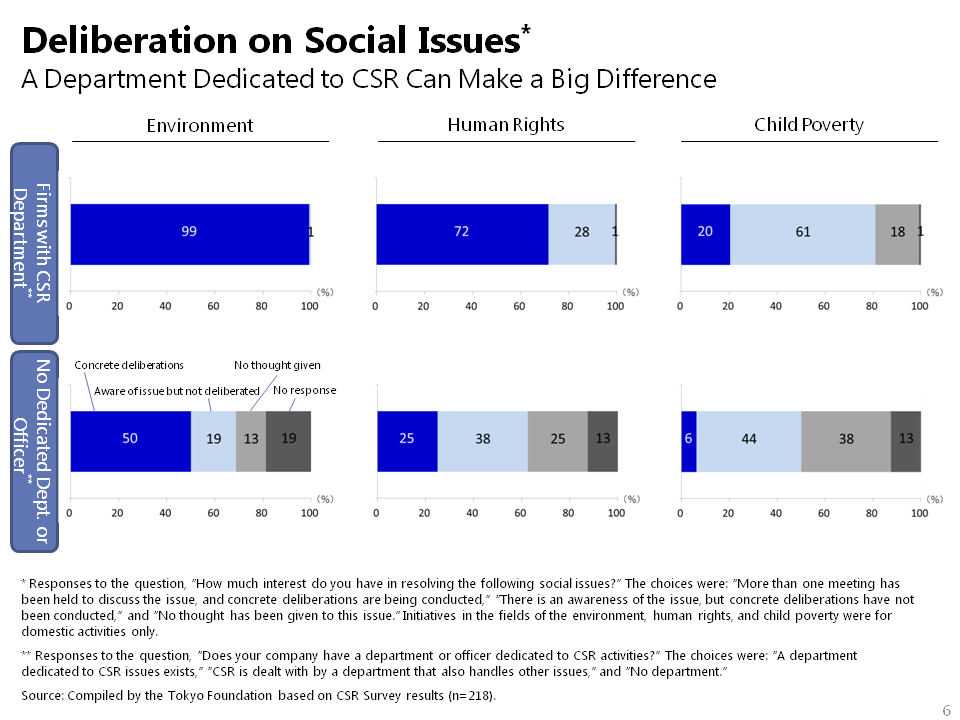- Article
- Industry, Business, Technology
Overview of CSR in Japan: Ideals, Intentions and Realities at Advanced Companies
September 10, 2014
Addressing Social Issues That Government Alone Cannot Resolve
Up to now people in Japan have tended to think of it mainly as the government’s job to deal with matters like the environment, human rights, women’s advancement, and poverty. But now the situation has become more complex. For example, when we consider the factors seen as contributing to poverty, including unemployment, dysfunctional families, and lack of education, it is apparent that the Ministry of Health, Labor, and Welfare, which is responsible for government policy in this field, cannot resolve the issues on its own; it is also essential to have cooperation from businesses and communities in order to create jobs. And in the case of large-scale disasters like the Great East Japan Earthquake of March 2011, the impact affects every aspect of people’s lives and cannot be addressed solely within the framework of public administration.
There are limits on the capability of government organs to deal with the public issues that we face. In order to cope with these issues, which are diversifying and developing a complex web of interconnections, we must call on the resources of society as a whole in support of the public realm.
Every social problem is in fact an amalgam of diverse individual woes, and its solution must involve all-out efforts not just by the government but by all sectors and strata of society, including businesses and citizens, based on a sense of their respective responsibilities. In particular, heightened expectations are being directed at the corporate sector, with its organizational strengths and funding clout.
“Landmine” Issues That Threaten Inattentive Japanese Companies
Meanwhile, with the progress of economic globalization, the impact of corporate business activities is rapidly expanding in scale. And corporate responsibility, which was traditionally seen as applying to a relatively narrow range, notably the interests of companies’ shareholders and consumers, has extended to encompass the environment, jobs, and human rights in regions far removed from their home countries.
Japanese corporations, responding to the shrinkage of their domestic market and taking advantage of the strength of the yen, have stepped up the pace and scale of their overseas mergers and acquisitions. As a result of this M&A activity, they are both procuring supplies and selling products in more countries, and they must simultaneously manage organizations in locations with different operating climates. This international expansion of their operations is accompanied by the expansion of the risks they face, a point that was highlighted back in the 1990s when Nike came under attack for the alleged use of child labor by suppliers in Southeast Asia.
Hideto Kawakita, who heads the nonprofit International Institute for Human, Organization, and the Earth (IIHOE), notes that the social issues that citizens view as important differ from country to country, citing the results of a survey of readers of environmental and social reports conducted by the NTT Group. For example, according to this survey, the share of people citing “protection of human rights” as a form of social responsibility that corporations should address is much higher in other countries—Britain, Germany, China, and Malaysia—than in Japan.
What this suggests is that a Japanese company whose management takes a Japanese view of human rights may find itself unable to deal with the risk of suddenly being sued at one of its overseas affiliates on the other side of the globe for violating human rights. So there is a strong need for Japanese corporations to address social issues from a public-interest perspective, not just to meet their social obligations but also to manage the risks of doing business globally. In other words, they must practice corporate social responsibility (CSR) to avoid stepping on “landmines” around the world.
Rising Expectations for Private-Sector Involvement
Though we hear much talk about the need for CSR, in practice the activities of Japanese firms in this connection tend to be limited to introductions of their “good deeds” and contributions to charity and documents drawn up to meet international CSR reporting standards. As matters stand, society cannot readily see the great potential that companies have as participants in efforts to address public issues, and companies cannot readily generate synergy through the sharing of know-how and the conduct of joint endeavors in this area. It is a shame to let these potential benefits go to waste.
CSR activities ought to allow companies to draw on their own problem-solving strengths and take the initiative in addressing social issues, thereby giving a competitive advantage in terms of business management as well, such as by letting them grasp new business opportunities, enhance their technologies and services, and recruit and develop superior human resources.
We believe that it should be possible to tap the strengths of Japan’s corporate sector in a strategic manner. The question is what is required in order to break away from rigid reliance on the government, which faces severe fiscal constraints, and get the private sector more involved, making it possible for corporations to change society for the better.
To address this question, the Tokyo Foundation launched a CSR survey of about 2,000 companies around Japan, including listed corporations, major unlisted companies, and major foreign affiliates, seeking to investigate the relationship between Japan’s companies and social issues.
Five Common Points in Japanese CSR Efforts
Our survey contained numerous questions concerning companies’ thinking about social issues. These seem to have caused considerable confusion among the respondents, who made comments like, “We’ve never been asked how we define social issues,” and, “We don’t know how to respond, since the question is not related to the CSR guidelines.” These responses suggest that Japanese companies are not accustomed to considering social issues from an autonomous perspective.
Below we cite five common points that emerged from the survey.
1. Domestically, many companies are undertaking efforts in the areas of the environment, human rights, and women’s advancement, but few are addressing the issue of poverty. Overseas, the top area they are addressing is the environment.
2. Environment-related efforts approach the ideal in terms of being integrated with business operations, but efforts in the areas of human rights and women’s advancement are mainly directed at people inside the company.
First of all, what specific types of social issues are Japanese companies addressing through their CSR activities? Many are involved in initiatives relating to environmental protection, respect for domestic human rights, and women’s advancement within Japan. But their human-rights-related activities are generally undertaken in the context of legal compliance and corporate governance, involving employee education and similar efforts aimed at preventing sexual harassment, power harassment, discriminatory behavior, and other abuses within the company. And their efforts for women’s advancement aim to make it easier for women to be dynamically engaged within the company and thereby to improve the company’s image (see Figures 1 and 2).
Figure 1
Figure 2
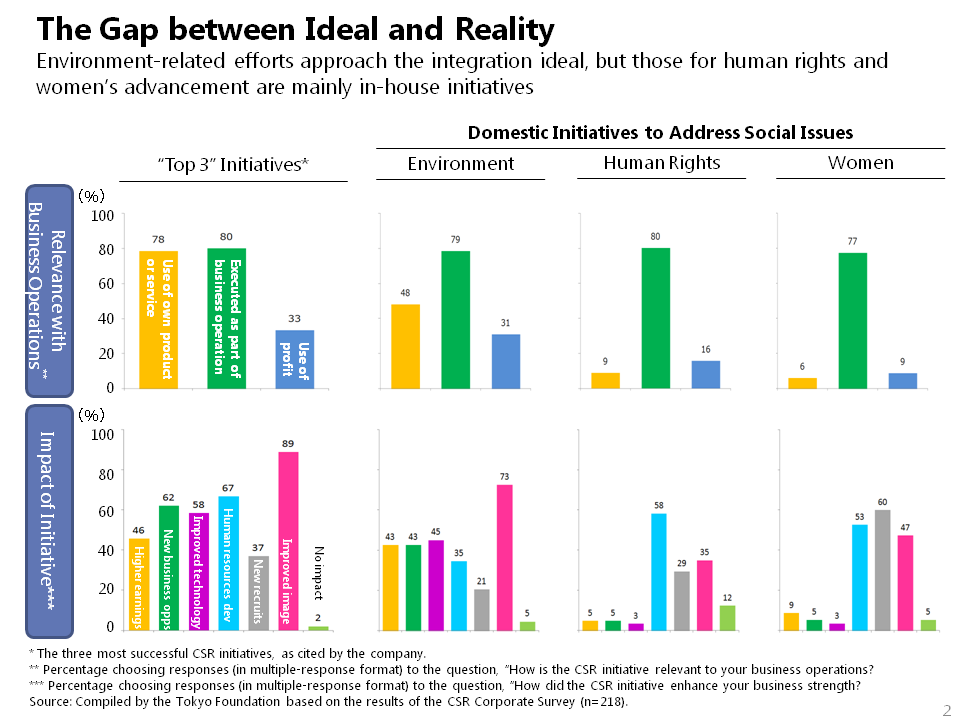
3. Companies are aiming to integrate their CSR activities and their business operations, but they have yet to approach this ideal.
Focusing on the CSR initiatives that companies viewed as successful, the companies were asked how these initiatives were relevant to their business operations and how they enhanced the company’s strength.
In terms of relevance, the most common replies were that the initiatives had allowed companies to make good use of their own products or services and that it had been possible to incorporate them into the company’s business processes. In terms of enhancing the company’s strength, the respondents cited a wide range of benefits, including improvement of the company’s image, development of human resources, new business opportunities, enhanced technologies, and increased earnings (see Figure 3). The ideal for companies is to “integrate” their CSR activities and their business operations, achieving business success while producing a positive impact in addressing social issues.
Figure 3
When it comes to environment-related initiatives, an area in which Japanese companies are strong, they have been able to approach this ideal in many cases. But in other areas the ideal is proving harder to realize. Consider, for example, the area of human rights, which, as noted above, is one where Japanese companies face strong demands overseas. So far they have undertaken few initiatives in this connection outside of Japan. And the steps they have taken within Japan are largely related to their legal compliance efforts, such as paying attention to human rights in their business processes and adding this subject to their employee training programs; they have not reached the point of actively working for social change through their business activities.
The issue of human rights has traditionally been something of a taboo topic within Japan, and so it has been difficult for companies to address it. But we are now in an age when the US Department of State is regularly issuing reports on human rights concerns in countries around the world, including Japan, and so Japanese companies can no longer keep up this posture of neglect. In this connection, the efforts by Takeda Pharmaceutical and Dentsu that we introduce below are pioneering initiatives that address this issue both from the business side and as a CSR concern.
In any case, the results of the survey reveal that, while many corporations are pursuing the integration of CSR and their business operations as their ideal, it is a difficult matter to realize this ideal in connection with specific issues. Before we consider the reasons for this difficulty, let us first look more closely at the concept of “integration” itself.
Two Yardsticks: Contributions to Resolving Social Issues and Contributions to Business Operations
In the business world, approaches like product portfolio management rely on a pair of yardsticks, namely, market growth and market share. In CSR as well, there are two independent yardsticks that play a key role in integrating contributions to resolving social issues and contributions to business operations: (1) importance for corporate management and business operations and (2) importance in terms of benefits for society—in other words, importance in terms of the public interest.
In order to achieve the desired integration of CSR and business operations, it is essential to aim for activities that will maximize both the contribution to resolving social issues and the contribution to business operations. But our survey revealed that this is hard to achieve in practice.
4. There is a greater emphasis on taking action to implement CSR than on deliberating how best to address social issues.
Corporations naturally devote much attention to the contribution of activities to their business operations. But their focus tends to blur when it comes to contributions to resolving social issues. This aspect is generally left up to the judgment of individual employees based on their own values and conscience, and often there is no deliberate coordination among employees in this connection.
So the CSR reports from Japanese corporations often feature snapshots of executives and employees taking part in volunteer activities, along with blurbs reporting on these efforts. In other words, they tend to be catalogs of “good deeds” by people from the company. Of course, one cannot complain about good deeds, but it is extremely rare to see CSR reports that actively present an integrated view of the social issues that the company sees in its own area of business and the actions it is taking to address them.
Figure 4
This state of affairs can also be seen in the findings of our survey. In Figure 4 we show an issue-by-issue breakdown of the answers to two questions: “How much interest do you have in resolving the following social issues?” and “Which of the following issues are you taking concrete initiatives to resolve?” The results of this breakdown are interesting. For many issues, the number of companies that have taken concrete action is higher than the number that have held repeated meetings to discuss the matter. When it comes to business management, a company would never skip the deliberation process, including advance studies, but in the case of CSR they move straight to implementation.
Of course there are some areas, such as the environment, in which Japanese companies are proficient and have been active for many years. For issues like these, it is quite conceivable that companies completed their deliberations at an earlier stage and were already at the implementation stage at the time of our survey. But overall the results seem to indicate a strong bias toward action. This is also seen in the areas of poverty and human rights, which are fields in which companies will be expected to do more in the future.
What we see here is a stress on doing good deeds, whatever they might be, and producing results. It is possible that the process of deliberating why particular actions are appropriate for the company to undertake at a particular time is being neglected. It may not be fair to suggest that companies are merely taking actions so that they can fill up the pages of their CSR reports, but the fact that not a single social issue was the object of more cases deliberated than of actions taken would seem to indicate that, when it comes to CSR, companies are not undertaking the sort of advance deliberation and analysis based on a long-term perspective that they practice in their business operations. An emphasis on action sounds good, but it is actually detrimental if it means that companies are taking a “stapler” approach to CSR: merely putting together sheaves of documents cataloging the good deeds they have done for society on an unsystematic basis.
The Case for Guidelines-Based Integration
How can companies switch from their current “stapler” approach to an approach that emphasizes deliberation as the way to integrate CSR with their business activities on a systematic basis? One way for companies to consider what issues to address with concrete action in a more comprehensive and effective manner is through the use of guidelines.
One of the major sets of guidelines for CSR activities is the ISO 26000 standard, which groups social issues to be resolved into “core subjects” based on the perspectives of all stakeholders and breaks these down into detailed lists of issues. For example, one of the core subjects is human rights, under which eight issues are listed; it is recommended that companies decide on appropriate initiatives of their own to deal with each of them.
(1) Due diligence: Check for violations of human rights within the organization proper and in related organizations (client organizations); if violations are found, correct them.
(2) Human rights risk situations: Special care should be taken in situations where governments are corrupt and with business relationships that are not protected by law, since violations of human rights can easily be overlooked.
(3) Avoidance of complicity: Avoid the earning of improper profits from human rights violations, including profits earned through the organization’s complicity in such violations and through violations by others.
(4) Resolving grievances: Resolve grievances by establishing systems that make it possible to notify the organization when human rights have been violated.
(5) Discrimination and vulnerable groups: Prohibit direct or indirect discrimination against all those connected with the organization, and give special consideration to providing equal opportunities and respecting the rights of vulnerable groups whose members are liable to be placed at a disadvantage.
(6) Civil and political rights: Respect people’s rights to live with dignity as human beings and as members of society, including their freedom of speech and expression and freedom to participate in politics.
(7) Economic, social and cultural rights: Respect people’s rights to pursue lives of happiness and of good mental and physical health.
(8) Fundamental principles and rights at work: Respect the fundamental rights at work identified by the International Labor Organization (ILO), including freedom of association, the right to collective bargaining, elimination of forced labor, abolition of child labor, and elimination of discrimination.
By referring to this set of guidelines organized by core subjects and issues, companies can shift from a collection of ad hoc “good deeds” aimed at promoting respect for human rights to a more systematic program, mapping the connections between the ISO 26000 core subjects and issues and their own business operations and identifying the areas in which their efforts have been lacking up to now.
Japanese companies face major risks if they try to extend their operations to places like Europe and Southeast Asia—where, as we noted above, people have high expectations regarding respect for human rights—without reconsidering their existing mind-sets and equipping themselves with concrete images and methods to address the relevant issues. If they adopt a more systematic approach and follow established guidelines, they will be able to conduct dialogue with customers and various other stakeholders in the countries where they are operating, including local government bodies, residents, and employees. This will make it possible for them to ascertain their stakeholders’ expectations and deliberate on the importance of the expected actions for their own business operations (see Figure 5). This approach goes beyond the realm of CSR and links up directly with the company’s business risk management.
Figure 5
Figure 6
5. Having a department dedicated to CSR can make a big difference.
In the light of what we have considered so far, we can see that it is vitally important for corporate management that the company has a department dedicated to CSR so as to consider all of the company’s initiatives to address social issues as a portfolio of programs and seek to integrate these activities with business operations. The results of our CSR survey indicated this clearly.
As shown in Figure 6, we found a clear correlation between the level of interest that companies show in resolving social issues and the presence or absence of a department dedicated to CSR. Quite naturally, an attempt to deliberate a social issue in concrete terms requires study, vision, and consideration of the impact of actions by the company on society and on the company’s business operations. Though individual employees may have a good values, knowledge, and enthusiasm, it is impossible to expect them to grasp the interrelations between social issues and business operations in their entirety through their own efforts alone. Just as in the case of developing a new line of business, it is necessary to handle the matter as a team effort involving full-time staffers and an organizational unit dedicated to this task.
Here, though, we encounter another tricky issue, namely, the position of the CSR department within the corporate organizational structure.
The Tendency for CSR Departments to Become Isolated
In tandem with the CSR survey, members of the Tokyo Foundation CSR project team conducted individual interviews with people at over 40 companies. The results of these interviews revealed that CSR still tends to “belong” to specific individuals. We found two patterns: one where CSR relies on the strong involvement of a senior executive and one where it relies on the persistent efforts of the responsible department.
In just about every company where a CSR department exists, it lacks organizational clout and has few employees. Since the number of the department’s employees is small relative to the weight and scope of its responsibilities, the ability to get things done depends largely on the enthusiasm of the individual employees. So the CSR activities end up “belonging” to these individuals.
If a top executive like the president or chairman of the board is strongly committed to CSR, it can have a strong impact on the company as a whole, and the work can be fulfilling. But it is rare for both patterns of “belonging” to coexist in a single company. And in any case, operations that rely on the power of individuals lack sustainability.
Why are CSR operations liable to end up belonging to individuals? The underlying reason is that the time frame for corporate management from a CSR perspective is different from that for business-cycle management. A CSR department is looking at social issues that cannot be resolved quickly, and so its sense of time is not the same as that of other departments scrambling to deliver results on a quarterly basis. This difference between long-term and short-term outlooks often results in the isolation of the CSR department from the rest of the company.
Since CSR departments address themselves mainly not to the company’s employees and customers but to society as a whole on various levels, including citizens and governments, they tend to develop long-term mind-sets. From the standpoint of executives and people in other departments working under medium-term management plans with spans of two or three years, the ideas set forth by the CSR department are liable to sound like pretty thoughts lacking urgency.
Meanwhile, the older generation of executive officers and senior employees are liable to misunderstand the significance of CSR. Many executives still equate CSR with corporate philanthropy and the idea of “contributing to society,” thinking that it is something that is good to do but not essential. But in order for a company to avoid stepping on “landmines” as it undertakes international operations, it must conduct risk management based on the knowledge assembled by the CSR department concerning potentially dangerous issues. So CSR goes beyond the realm of corporate philanthropy and other voluntary contributions to society.
Above, we noted the risk that a Japanese company may suddenly find itself being sued at one of its overseas affiliates on the other side of the globe for violating human rights. In order to avoid this sort of risk and reconfirm the company’s social raison d’être, it is essential to adopt the long-term perspective of CSR as part of the business process—it is essential, in other words to integrate CSR and business operations.
One hopeful phenomenon in this connection is the generational shift in the way people view their relationship with society. Japanese corporate employees who are currently in their forties or over tend to be highly focused on their own companies and relatively lacking in interest in external phenomena. By contrast, those in their thirties or under tend to seek their personal sense of worth not from their performance within the company but from their involvement with society. In other words, younger employees are more open to the world beyond their own company and seek to interact with it naturally. Tapping the power of this younger generation may make it possible for corporations to change society.
Where Are the Corporations That Can Change Society?
The results of our survey and interviews have given us a picture of the kind of corporations that can change society, the types of ideas they are implementing, and the sources of their motivation. We found three points characteristic of such corporations: (1) They are thinking and acting over a long time frame in integrating their efforts to help resolve social issues and their own business operations. (2) They are keeping up efforts to tap their own corporate strengths in working to resolve social issues. (3) They have established concrete systems to channel their strengths for this purpose.
In closing, let us introduce the case of six Japanese corporations that have been constructing relationships with society by appropriately identifying and tapping their own strengths.
1. Sompo Japan Insurance Inc.: Focusing on dialogue
In order to identify the strengths that are required in order to integrate contributions to resolving social issues with its own business operations, Sompo Japan, has been earnestly conducting dialogue with outside stakeholders. This ongoing dialogue has been clarifying what society expects of the company and which of the company’s strengths should be tapped in order to meet these expectations. The capabilities that this company has displayed in a distinctive, highly visible manner both around the world and within Japan, notably in the areas hit by the March 2011 Great East Japan Earthquake, actually exist—perhaps less visibly—within many other Japanese corporations.
2. Itochu Corporation: A bottom-up approach
Itochu has been drawing on its corporate culture of conducting operations based the awareness and motivation of its individual employees. Though the results may seem to lack overall coherence, the company has built ties with society in a manner befitting a trading company. The bottom-up approach it has been taking, relying on input from the front lines of its operations extending around the globe, is also effective for risk management.
3. Takeda Pharmaceutical Company Limited: Global partnerships
Takeda has gone global in order to compete successfully with the world’s other giant pharmaceutical companies. Through the partnerships it has established around the world, it is striving to respond to society’s expectations and demands by “creating and sustaining corporate value”—in other words, by activating the positive and offsetting the negative.
4. Kirin Company, Limited: Unification with brand strategy
In 2013 Kirin consolidated its beer, wine, and nonalcoholic beverage operations into a single integrated beverage business within Japan. Its approach to CSR differs from those of the three companies cited above, focusing on “visualizing” the integration of CSR with the organization and with specific business strategies. In its quest to lengthen the lives of its products in Japan, the country with the world’s most demanding consumers, the company has found the answer in the integration of CSR with its brand strategies, aiming to create shared value for society and the company through its business operations.
5. Dentsu Inc.: A “lab” model
Advertising and public-relations giant Dentsu promotes employee initiative through “labs”—small groups of employees from different sections of the company, whose joint activities are recognized as part of the employees’ jobs. These labs, made up of people who are professionals at expressing and delivering messages, can turn an issue like human rights into something with a different sort of potential. Dentsu, while nurturing the sort of thinking and posture that form the foundation of moves to create a society embodying diversity, has also achieved solid integration of these efforts with its own business operations. Dentsu’s lab activities, which attract individuals and have the potential to change society, offer a new model of organization.
6. Akebono Brake Industry Co., Ltd.: Continuation
Akebono, which boasts a large share of the global market for automobile brakes, has been undertaking CSR activities over a longer time span than any other company considered in this overview. It has been making contributions in the field of education for 50 years, and though these activities may seem to have no direct connection with its business operations, they have had an impact in connection with other social issues and have in fact had a positive effect on the company’s business. Akebono’s initiatives also offer good hints for addressing issues like diversity and inclusion, which have become important concerns for contemporary corporate management.
